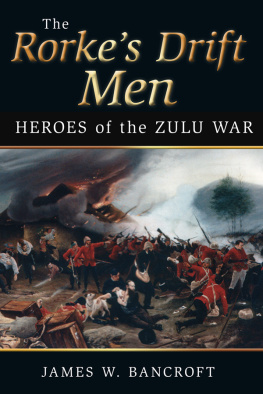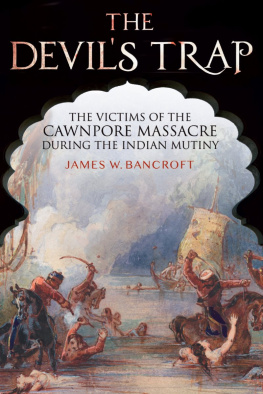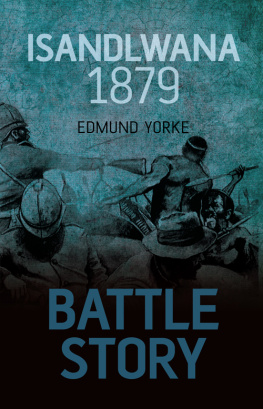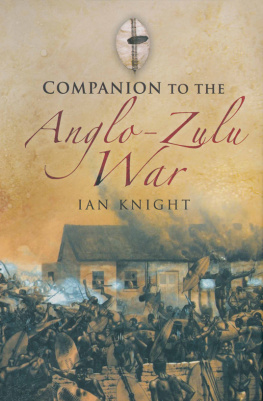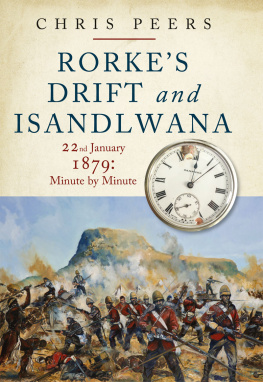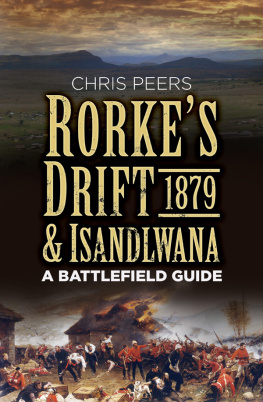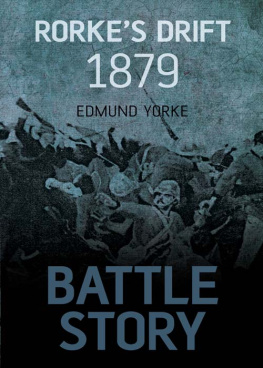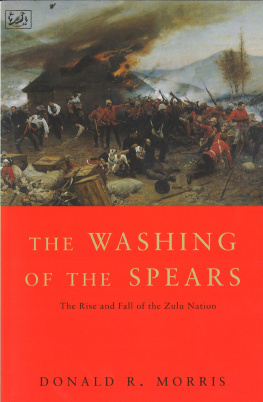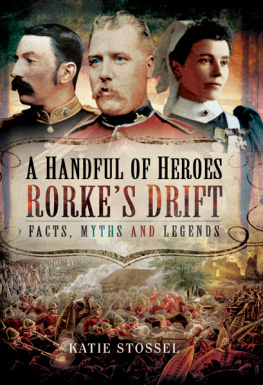

HEROES OF THE ZULU WAR
JAMES W. BANCROFT

First published 2010 by
Spellmount, an imprint of
The History Press
The Mill, Brimscombe Port
Stroud, Gloucestershire, GL5 2QG
www.thehistorypress.co.uk
This ebook edition first published in 2016
All rights reserved
James W. Bancroft, 2010
The right of James W. Bancroft to be identified as the Author of this work has been asserted in accordance with the Copyrights, Designs and Patents Act 1988.
This ebook is copyright material and must not be copied, reproduced, transferred, distributed, leased, licensed or publicly performed or used in any way except as specifically permitted by the publishers, as allowed under the terms and conditions under which it was purchased or as strictly permitted by applicable copyright law. Any unauthorised distribution or use of this text may be a direct infringement of the authors and publishers rights, and those responsible may be liable in law accordingly.
EPUB ISBN 978 0 7509 8060 9
Typesetting and origination by The History Press
eBook converted by Geethik Technologies
Contents
Foreword
On 22 January 1879, a garrison of British soldiers successfully defended the storehouse and field hospital at Rorkes Drift against an army of Zulu warriors. This heroic stand has been written about extensively and inspired the epic film Zulu! Yet, surprisingly, information about the soldiers who took part has not been so readily available. The main bulk of the troops who defended the post came from 2nd Battalion 24th Regiment, particularly B Company, with some men from the 1st Battalion, men of the Royal engineers and the Royal Artillery. There was also a sergeant from the 3rd Regiment and a corporal of the 90th Light Infantry, and there were colonials from the Natal Mounted Police and the Natal Native Contingent. There were also several men from the Armys Medical and Commissariat departments, a member of the general staff, a chaplain and a civilian ferryman.
Most of the rank-and-file soldiers in the garrison were rough-and-ready lads from the coal mining and cotton manufacturing communities in and around city slums, and their only alternative to the highly-disciplined life in the British Army was the precarious environment and drudgery of the pit and mill. In addition to this there were a number of men present who had gained a great deal of experience serving in various campaigns around the world. This combination, and their staunch loyalty to their regiment made them a formidable fighting unit, and the rifle in their hands gave them a decisive advantage! The Zulu warriors who fought at Rorkes Drift were undoubtedly a fearless foe, who expected to face little resistance from the small garrison. However, the British fought for their lives with great gallantry, and held the Zulu assaults back so stubbornly that the warriors lost heart and retreated back across the river border. Sixteen gallantry medals were awarded to defenders, one being cancelled at a later date. Seven were presented to soldiers of the 24th Regiment, which was the most ever given to one unit for a single action. There have been attempts to devalue what is considered by some to be a high number of recognitions, but it was no more than they deserved. In fact, the important part some men played was definitely overlooked.
More than 125 years after the campaign the names Rorkes Drift and Zulu are still immediately recognised and stir great passion. However, many Rorkes Drift men returned to a life of poverty, and a struggle for survival equal to that which they had endured on active service, and in some cases their lives were rocked by heartbreak and terrible tragedy. Most had faded into obscurity until now. The Rorkes Drift Men contains biographical tributes to all the defenders known to me, with information drawn from eyewitness accounts, official reports, military service records, census returns and other official civilian documentation. I have tried to present the work in the form of biographical tributes as opposed to lists of facts and figures. The basis of the work has been my own files concerning British courage and achievement compiled over the past 35 years, with additional help from numerous Zulu War enthusiasts and family descendants of defenders, particularly Kris Wheatley, a great-granddaughter of Caleb Wood, whose enthusiasm for the subject and standard of research concerning the defenders of Rorkes Drift must be applauded. I also acknowledge the help of the Royal Corps of Transport, the Royal Army Medical Corps, both museums being in Aldershot; and Alun Baynham-Jones, the curator and associates at the South Wales Borderers Museum at Brecon, which should be the first visit of anyone wishing to further their knowledge of the subject.
James W. Bancroft, Eccles, 2010
The Defence of Rorkes Drift
Tension between British authority and various factions in South Africa had been building up for years prior to 1879, especially concerning the independent-minded Boer farmers and the warrior nation of the Zulu. Because of this, many British Army units were already in South Africa taking part in the ninth of a series of Cape frontier wars. The 2nd Battalion had embarked on the troopship Himalaya on 1 February 1878, for active service at the Cape. This campaign consisted mainly of sweeping skirmishes to flush rebel natives out of the bush, and the rebel leaders were captured and dealt with by mid-1878. However, the main threat to stability in the region came from the highly-disciplined army of fearless Zulu warriors. In order to deal with the Zulu threat the British issued a deliberately harsh ultimatum to the Zulu king, Cetshwayo. British forces began to build up at strategic places along the border with Zululand, and when Cetshwayo failed to comply to the ultimatum, they invaded in three main columns on 11 January 1879. The 3rd (Central) Column, under the Commander-in-Chief, Lord Chelmsford, crossed the Buffalo River into Zululand at a commandeered mission-station known as Rorkes Drift. The main bulk of this section of the invasion force was made up of soldiers of the 24th Regiment, which left B Company of the 2nd Battalion to garrison the storehouse and field hospital which had been established there, along with some men from other imperial and colonial units.
The main invasion force set up camp in enemy territory on the slopes of a rock feature called Isandlwana. However, Lord Chelmsford considered this to be a temporary base, so on the morning of 22 January 1879 he took half his force forward to find a suitable site for an advanced base camp, and to try to locate the enemy; leaving over a thousand British and colonial troops to guard the ill-prepared camp. Later that day a vast Zulu army swarmed down from the hills around Isandlwana in a devastating surprise attack. In the initial stages of the battle firepower from the British ranks kept the Zulus back, but the 24th Regiment were eventually overwhelmed by the enemys superior numbers and were forced to stand and fight in hopeless disorder. They were massacred almost to a man, but the few survivors of the battle, and the warriors themselves, told how the British soldiers stood back-to-back and fought bravely for their lives until they fell like stones. A wing of the Zulu army, consisting of four regiments of warriors about 4,000-strong, who had not washed their spears, advanced into Natal seeking additional blood at Rorkes Drift.
Next page
